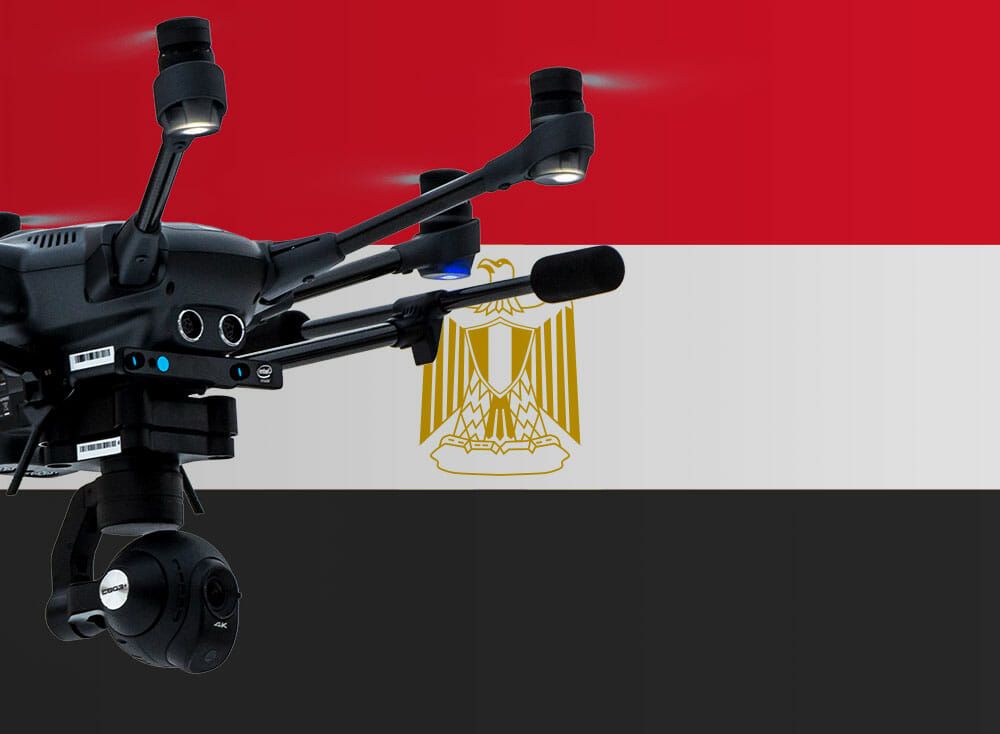Drones Activity Over The Pyramid and Beyond

In 2017, the Egyptian government enacted law No 216, prohibiting the manufacturing, importation, trading, possession and most significantly, the use of drones in Egypt. Although the law made exceptions, stating that individuals could only perform any activity with drones if they have legally obtained a permit from the “competent authority”.
Drones!?
Launching into the tech space, drones became popular because of their ability to take really cool landscape pictures. An average man saw his capacity to control a miniature plane and take amazing videos or pictures from the sky. This definitely rocked social media, everybody wanted one. Yet the purpose of a drone was far beyond cool pictures and a pilot feel.
Drones came as a need by scientists and engineers, they wanted to create an unmanned aircraft system. As a result, they created a flying robot that can be controlled by software programming, which has its air routes planned and works with a GPS or with direct remote control.
The idea was for it to function as a tool to help humans in various sectors. With its flight and navigation movement, it could be of good assistance with surveillance, delivery services, search and rescue, firefighting, videography and many more. So far the miniature air parader has been able to achieve its purpose in various sectors, which has caused different system updates on the gadget.
Drone Activity In Africa.
Africa as a developing continent embraces recent technologies, and the need for the continent to grow has made it keen to accommodate gadgets, initiatives and technologies that promise developments within its communities.
Easing off the lockdown across African nations, various initiatives were launched post-pandemic which showed obvious signs that people had time to think. Startups came up with ways to help with deliveries, medicine, agriculture, entertainment and many more.
The are various startups across Africa that maximize the functions of drones to meet the average man at the point of his needs. Examples will include Arone in Nigeria, Sasini In Kenya, Areobotics in South Africa and Zipeline in Rwanda. Each of these startups and many more have been contributing to the development of their nation in different ways they can. With restrictions in Egypt, it is important to know that drones are still a lifestyle in the Northern African nation.
Drones Beyond The Pyramid
Prohibition or not, it is not news that humans will always find access to goal fulfilment this is the case of Drofie Egypt.
Launched in 2016 by native Egyptian, Mohamed Ghaith, Drofie was developed to provide users with access to a done-based camera. This technological tool is known to assist users with the content production of motion pictures.
Although Drone law No 216, still functions, Dorfie recognized the clause around it and took maximum advantage of it. The law noted that the weight of each drone should not exceed 150 grams and should not fly above 100 meters, this was the avenue Drofie maximized, disregarding the need for a licence.
In an interview with Egyptnovate, Mohamed revealed the changes Drofie made to become a reality. ” Drofie weighs only 140 grams. In some countries like Egypt, drones are not allowed to fly above 30 meters for them to be used as personal gadgets to capture your precious moments, not someone else’s. As a team, we’ve worked for more than a year on research and prototyping a convenient product to be used by customers anytime, anywhere without having to worry about security issues.”
Being the only “startup” that currently runs this tech spot, Drofie has made some financial marks through this initiative. In June 2016, the startup won US$26,000 from the Kickstart Accelerator a Switzerland-based accelerator, to help develop the initiative across Egypt.
The initiative has won the hearts of many with its pocket-size feature, affordability rate and its law-abiding design.
Yet Drofie is not the only initiative with a drone in the country. Although it is not a startup, The Nut is an Egyptian military tool used to carry out defence activities. in a report by Al-Monitor, ” it is designed for reconnaissance in both day and nighttime environments and can reportedly carry up to a 50-kilogram payload. It was produced jointly by the Arab Organization for Industrialization and the Military Technical College.”
Even though flight movements are highly restricted in the North African country, it is obvious that desperate times do call for desperate measures even in tech.
Hopefully, the laws can be revisited to give room to more drone features, this will encourage more startups, to develop other initiatives that can function with the use of drones, especially deliveries.
it will be nice to see more drones beyond the pyramid.
